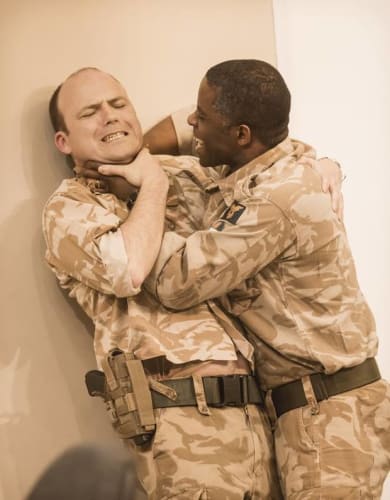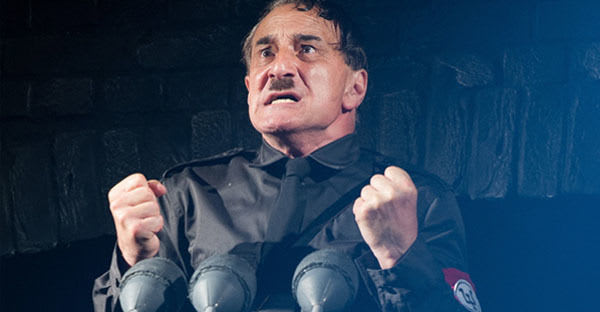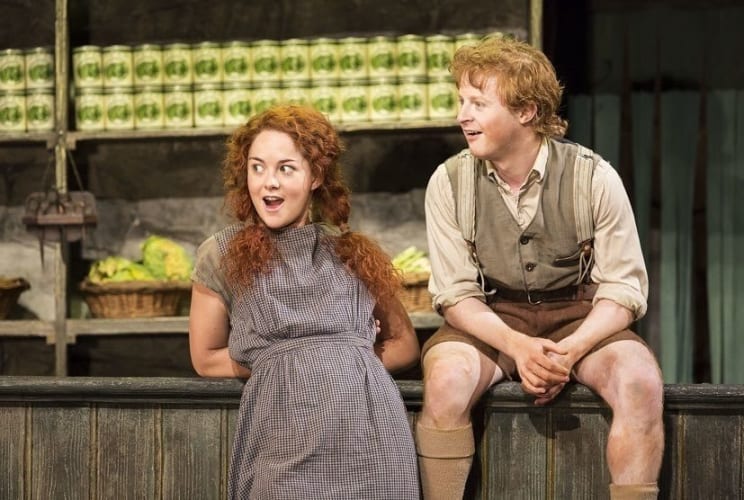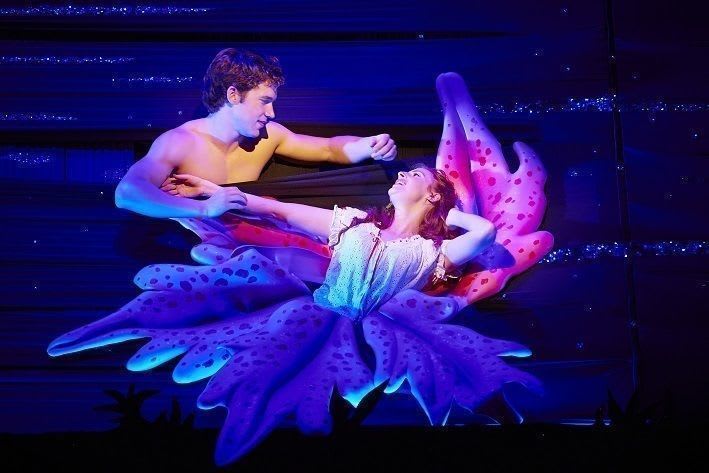West End Plays
In the West End, the year saw two new companies launched and a predominance of comedy, with serious dramas generally failing to reach the highest standards.
Following his tremendous success at the Donmar and one previous West End season, Michael Grandage promised much with a five-play programme featuring a bevy of well-known screen stars.
He started on a real high with a revival of Peter Nichols's Privates on Parade starring Simon Russell Beale as a cross-dressing army sergeant.
This gave Britain's finest stage actor the opportunity to camp it up imitating amongst others Marlene Dietrich and Carmen Miranda in a very funny but sometimes touching portrait of National Service in the Far East.
Next up Ben Whishaw and Dame Judi Dench starred as Peter and Alice, the individuals on whom Peter Pan and Alice in Wonderland were based.
John Logan's script never really took off despite the efforts of one of the best acting combinations to hit the stage during the year.
The Cripple of Inishmaan is the blackest of black comedies even by Martin McDonagh's standards. Daniel Radcliffe bravely took on the title role in a cast otherwise exclusively drawn from Ireland.
An uproarious evening owed much to Radcliffe but playing opposite him, Sarah Greene was always in danger of upstaging the Harry Potter star, helped by a dream of a character.
A Midsummer Night's Dream was built around another big screen name, David Walliams turning Bottom into the campest of mechanicals and taking all of his colleagues with him.
An unbalanced production pleased fans of Mr W but was unlikely to have quite the same effect on purists, who would at best have had mixed feelings.
The season ended with Jude Law taking on Henry V. Grandage and his star presented an interesting reading during which a King normally viewed as a giant amongst men became far more human, if not humane, perhaps intending to mirror those currently in line to the throne? This was particularly effective in the wooing scene, where unusually the monarch was not obliged to change his character one jot as he transported himself from warrior to suitor.
Jamie Lloyd also set up a company in his own name, playing at Trafalgar Studios. His opening sally saw James McAvoy playing Macbeth with Clare Foy as his lady, in a Scots company that modernised the play and gripped the attention from start to finish in one of the Shakespearean highlights of the year.
His season also included a revival of Harold Pinter's outrageous comedy The Hothouse, Russell Beale making another West End appearance opposite John Simm as a mad doctor in a mad institution in which even the patients might not be sane.
Competing with Russell Beale for acting honours was Henry Goodman, cast by Jonathan Church in Alistair Beaton's new version of The Resistible Rise of Arturo Ui by Bertolt Brecht. It cannot be easy to portray a cross between Adolf Hitler and Al Capone as a comedy character, though Charlie Chaplin did it successfully.
To suggest that Henry Goodman can compete with Chaplin and others is to give him the highest praise but he fully deserves it.
Perhaps the best arrival in the West End has sadly had its run curtailed at the moment. The Curious Incident of the Dog in the Night-Time was a runaway hit in the Cottesloe and has been selling out at the Apollo as well. Sadly, following one of those freak accidents that nobody can account for, the theatre is sadly dark and the play either on hold or looking for a new home.
One sincerely hopes that everything gets back to normal very quickly, for the sake of everybody involved in the production and also those unlucky audience members who deserve a chance to see an outstanding show.
The West End enjoyed a number of other unforgettable moments, almost all of which were generated by revivals of plays from the second half of the 20th century.
Ian Rickson's second look at Mojo, the play the launched Jez Butterworth's career, proves that the piece is still as fresh today as it was first time around at the Royal Court.
Peter Nichols has had a good year, since Passion Play, his clever dual look at love, made a strong impression in the West End before the memory of Privates on Parade had dissipated. It was graced by a fine cast who probably enjoyed performing just as much as the audience did watching them.
It is hard to imagine a year when Harold Pinter will not be making multiple appearances and during 2013, the intrically plotted tale the mysterious love, Old Times returned to the West End with Rufus Sewell in situ but Kristin Scott Thomas and Lia Williams swapping the other two roles on a nightly basis. This might sound gimmicky but if it helps to sell seats and please a couple of fine actresses, who can complain?
The Chichester transfer of Private Lives with Anna Chancellor and Toby Stephens may not particularly have appealed to this critic but got enough five-star reviews first time around to ensure its popularity.
Sir Alan Ayckbourn and Simon Gray are other perennial London favourites. They were represented respectively by Relatively Speaking and Quartermaine's Terms. Both productions were enjoyable without being outstanding but acted as good reminders of the talents of two of Britain's best playwrights of the late 20th century. There were also a couple of slivers of Alan Bennett under the title Untold Stories expertly delivered by Alex Jennings.
Continuing the comedy theme, Jeeves & Wooster in Perfect Nonsense starring Stephen Mangan and Matthew Macfadyen, not to mention Mark Hadfield, all under the direction of Sean Foley. This was an unexpected delight that, like its theatrical cousin The 39 Steps, should run and run.
It is also worth paying homage to Barry Humphries and his alter egos, Dame Edna Everage and Sir Les Patterson. Despite reaching the august age of 79, the Australian comedian is still delighting packed houses at the Palladium in Eat Pray Laugh!, which is billed as a farewell tour but who knows?
At the dramatic end of the scale, Twelve Angry Men made yet another appearance and, while not necessarily enjoying the best production ever, still has the ability to hold the audience's attention as Martin Shaw's juror plays clever mind games with his 11 fellows.
The Audience by Peter Morgan was strictly for royalists and fans of Dame Helen Mirren, who reprised her success in The Queen much to the delight of her very strong following.



